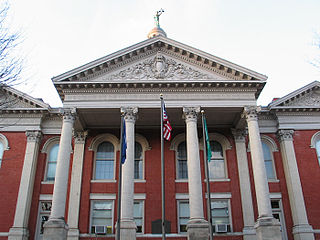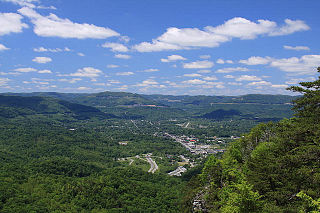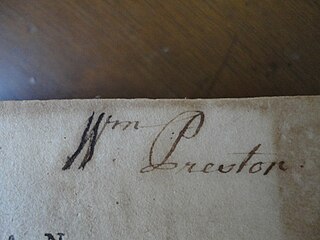Early life and capture
Campbell was born in Augusta County, Virginia in 1743. When just fifteen years old, he volunteered as a militiaman, to perform duty in protecting the colonial frontier from incursions by the Indians. He was stationed at a fort near where the road leading from Staunton to the Warm Springs crossed the Cowpasture River.

Augusta County is a county located in the Shenandoah Valley on the western edge of the U.S. commonwealth of Virginia. It is the second-largest county in Virginia by total area, and it completely surrounds the independent cities of Staunton and Waynesboro. The county seat of Augusta is Staunton, although most of the administrative services have offices in neighboring Verona.

The militia of the United States, as defined by the U.S. Congress, has changed over time.

The Cowpasture River is a chief tributary of the James River in western Virginia in the United States. It is 84.4 miles (135.8 km) long.
While engaged in this service, he was captured by the Indians, who loaded him with their packs, and marched him seven days into the forest. His captors were from the area of Lakes Erie and Michigan, and were on their return from hunting. Campbell, at the end of the journey, was so exhausted that he was unable to travel, and was treated by the Indians with great severity. An old chief, taking compassion on him, protected him from further injury, and on reaching the Lakes adopted Campbell, in whose family the young man remained during his three years' captivity.
During this time, Campbell made himself familiar with the Indian language their manners and customs, and soon acquired the confidence of the old chief, who took him on all his hunting excursions. During these trips they rambled over present-day Michigan and the northern parts of Ohio, Indiana, and Illinois.
In 1759 (during the French and Indian War), a British force marched towards the Upper Lakes, of which the Indians were informed by their scouts. Campbell conceived the bold resolution of escaping to this force. While out on one of their hunting excursions, Campbell left the Indians, and after a fortnight's tramp through the pathless wilds reached the British. The British commander was much interested in Campbell's account of his captivity and escape, and with his intelligence, and engaged him to pilot the army, which he did with success. Shortly afterward he returned to Augusta County, Virginia, after an absence of more than three years. For his services in piloting the army he received a grant of 1,000 acres (4 km2) of land near Louisville, Kentucky. At the same time Campbell, along with Joseph Martin, began acting as an agent to the Indians, reporting back to Virginia governors Benjamin Harrison V, Edmund Randolph and others on the state of Indian-colonial relations. [1]

The French and Indian War (1754–1763) pitted the colonies of British America against those of New France, each side supported by military units from the parent country and by American Indian allies. At the start of the war, the French colonies had a population of roughly 60,000 settlers, compared with 2 million in the British colonies. The outnumbered French particularly depended on the Indians.
Military intelligence is a military discipline that uses information collection and analysis approaches to provide guidance and direction to assist commanders in their decisions. This aim is achieved by providing an assessment of data from a range of sources, directed towards the commanders' mission requirements or responding to questions as part of operational or campaign planning. To provide an analysis, the commander's information requirements are first identified, which are then incorporated into intelligence collection, analysis, and dissemination.

Joseph Martin, Jr. (1740–1808) was a brigadier general in the Virginia militia during the American Revolutionary War, in which Martin's frontier diplomacy with the Cherokee people is credited with not only averting Indian attacks on the Scotch-Irish American and English American settlers who helped win the battles of Kings Mountain and Cowpens, but with also helping to keep the Indians' position neutral and from siding with the British troops during those crucial battles. Historians agree that the settlers' success at these two battles signaled the turning of the tide of the Revolutionary War—in favor of the Americans.
In 1772, his father, David Campbell, and family, removed to the "Royal Oak," on Holston River. In 1775 he was one of the 13 signers of the Fincastle Resolutions, the earliest statement of armed resistance to the British Crown in the American Colonies. In 1776, Arthur Campbell was appointed major in the Fincastle militia and elected to the General Assembly. He was also a member of the convention for forming the State Constitution. When Washington County, Virginia, was formed he was commissioned colonel commandant of a regiment for more than 30 years, and during that time he commanded several expeditions, particularly that against the Cherokees, in December 1780 and January 1781, [2] with whom he made an important treaty. [3]

The Holston River is a 136-mile (219 km) river that flows from Kingsport, Tennessee, to Knoxville, Tennessee. Along with its three major forks, it comprises a major river system that drains much of northeastern Tennessee, southwestern Virginia, and northwestern North Carolina. The Holston's confluence with the French Broad River at Knoxville marks the beginning of the Tennessee River.
The Fincastle Resolutions was a statement adopted on January 20, 1775 by thirteen elected representatives of Fincastle County, Colony of Virginia. Part of the political movement that became the American Revolution, the resolutions were addressed to Virginia's delegation at the First Continental Congress, and expressed support for Congress' resistance to the Intolerable Acts, issued in 1774 by the British Parliament. Other counties in Virginia had passed similar resolutions in 1774, such as the Fairfax Resolves, but the Fincastle Resolutions were the first adopted statement by the colonists which promised resistance to the death to the British crown to preserve political liberties. The Fincastle men had fought in Dunmore's War against the Shawnee to the west and were not able to formally express their sentiments about the constitutional dispute until this time. The Fincastle representatives adopted the resolutions at Lead Mines,currently Austinville, Virginia located in Wythe County, Virginia which was then the location of the county seat. The Lead Mines county seat of Government would shortly thereafter move to Christiansburg, Virginia as Fincastle was divided into Montgomery, Washington and Kentucky counties of Virginia.

The Thirteen Colonies, also known as the Thirteen British Colonies or Thirteen American Colonies, were a group of British colonies on the Atlantic coast of North America founded in the 17th and 18th centuries. They declared independence in 1776 and formed the United States of America. The Thirteen Colonies had very similar political, constitutional, and legal systems and were dominated by Protestant English-speakers. They were part of Britain's possessions in the New World, which also included colonies in Canada, the Caribbean, and the Floridas.
After 35 years' residence at Holston, he removed to Yellow Creek, Knox County, Kentucky, the present site of Middlesboro, Kentucky.
Holston is an unincorporated community in Washington County, Virginia, in the United States.

Knox County is a county located near the southeastern corner of the U.S. state of Kentucky. As of the 2010 census, the population was 31,883. Its county seat is Barbourville. The county is named for General Henry Knox.

Middlesboro is a home rule-class city in Bell County, Kentucky, United States. The population was 10,334 at the 2010 U.S. census, while its micropolitan area had a population of 69,060.
He was tall, of a dignified air, an extensive reader and good talker. He married his cousin, Margaret Campbell, a sister of Gen. General William Campbell. He died from the effects of a cancer in Yellow Creek, leaving a widow, six sons and six daughters to mourn his loss.
When Middlesboro first attracted the attention of the business people of this country, and great developments were in progress at that point, the grave of Colonel Campbell was discovered in an out-of-the-way place, and his remains were removed by his Tennessee relatives, and the grave newly marked.



















